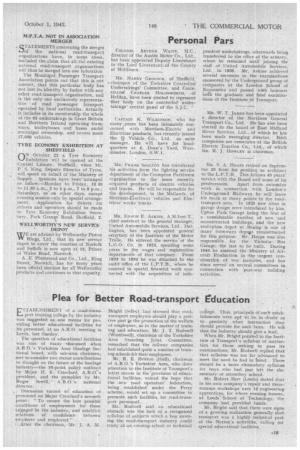Plea for Better Road-transport education
Page 21

If you've noticed an error in this article please click here to report it so we can fix it.
STABLISHMENT of a road-transLa port training college by the industry was suggested as. one means for providing better educational facilities for its personnel, at an A.R.O. meeting in Leeds, last Sunday.
The question of educational facilities was one of many 'discussed When A.R.O.'s Yorkshire Area Haulage Sec=
• tional board, with sub-area chairmen, met to consider two recent contributions to thought on the future of the haulage industry—the 10-point policy outlined by Major II. E. Crawfurd, A.R.07's president, and the pamphlet by Mr. Roger Sewill, A.R.O.'s national • director.
, Discussion turned to education of personnel on Major Crawfurd's seventh point: " To ensure the best possible conditions of employment for those tiigaged in the industry, and establish relations of confidence between -employer and employed."
After the chairman, -Mr. J. A. M.
Bright (Selby), had stressed that roadtransport employers should play a positive part i,n the promotion of the welfare of employees, as in the matter of training and education, Mr. J. T. Rodwell (Wombwell), chairman of the Yorkshire Area Standing Joint Committee, remarked that the railway companies had established quite a number of training schools f dr their employees.
Mr. R. E. Britton (Hull), chairman of A.R.O.'s Yorkshire Area, who drew attention to the Institute of Transport's latest moves in the'provision of educational facilities, voiced the hope that the new road operators' federation, being established under the Perry scheme, would set up a committee to. promote such facilities for road-transport personnel.
Mr. Rockwell said an educational obstacle was the lack of a recognized syllabus of subjects which a boy, entering the road-transport industry could study at an evening school or technical college. Thus, principals of such establishments were apt to be in doubt as to precisely what instruction they should provide for such boys. He felt that the industry should give a lead.
When Mr. Bright pointed to the Institute of Transport's syllabus of instruction for those seeking to pass its examinations, Mr. Rodwell replied that that syllabus was too far advanced to meet the need he had in Mind. There should be a more elementary syllabus for boys who had just left the elementary-or secondary school.
Mr. Robert Barr (Leeds) stated that in his own company's repair and main-' tenance workshops were 12 engineering apprentices, for whose eirening lessons, at Leeds School-of Technology, the company had provided funds.
Mr. Bright said that, there were signs of a growing realization generally that transport was a highly technical part of the Nation's activities, calling for special educational facilities.




















































